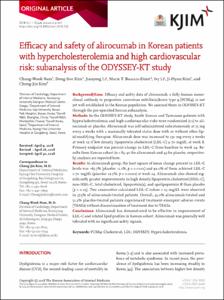KUMEL Repository
1. Journal Papers (연구논문)
1. School of Medicine (의과대학)
Dept. of Internal Medicine (내과학)
Efficacy and safety of alirocumab in Korean patients with hypercholesterolemia and high cardiovascular risk: subanalysis of the ODYSSEY-KT study
- Keimyung Author(s)
- Nam, Chang Wook
- Department
- Dept. of Internal Medicine (내과학)
- Journal Title
- Korean Journal of Internal Medicine
- Issued Date
- 2018
- Keyword
- PCSK9; Cholesterol, LDL; ODYSSEY; Hypercholesterolemia
- Abstract
- Background/Aims:
Efficacy and safety data of alirocumab, a fully human monoclonal antibody to proprotein convertase subtilisin/kexin type 9 (PCSK9), is not yet well established in the Korean population. We assessed them in ODYSSEY-KT through the pre-specified Korean subanalysis.
Methods:
In the ODYSSEY-KT study, South Korean and Taiwanese patients with hypercholesterolemia and high cardiovascular risks were randomized (1:1) to alirocumab or placebo. Alirocumab was self-administered subcutaneously at 75 mg every 2 weeks with a maximally tolerated statin dose with or without other lipid- modifying therapies. Alirocumab dose was increased to 150 mg every 2 weeks at week 12 if low density lipoprotein cholesterol (LDL-C) ≥ 70 mg/dL at week 8. Primary endpoint was percent change in LDL-C from baseline to week 24. Results from Korean cohort (n = 83: 40 for alirocumab and 43 for placebo, respectively) analyses are reported here.
Results:
In alirocumab group, the least square of mean change percent in LDL-C levels was –65.7% (placebo: 11.1%; p < 0.0001) and 92.0% of them achieved LDL-C < 70 mg/dL (placebo: 12.7%; p < 0.0001) at week 24. Alirocumab also showed significantly greater improvements in high density lipoprotein cholesterol (HDL-C), non-HDL-C, total cholesterol, lipoprotein(a), and apolipoprotein B than placebo (p < 0.05). Two consecutive calculated LDL-C values < 25 mg/dL were observed in 37.5% of alirocumab-treated patients. Overall, 45.0% alirocumab-treated and 51.2% placebo-treated patients experienced treatment-emergent adverse events (TEAEs) without discontinuation of treatment due to TEAEs.
Conclusions:
Alirocumab has demonstrated to be effective in improvement of LDL-C and related lipid profiles in Korean cohort. Alirocumab was generally well tolerated with no significant safety signals.
- Keimyung Author(s)(Kor)
- 남창욱
- Publisher
- School of Medicine (의과대학)
- Citation
- Chang-Wook Nam et al. (2018). Efficacy and safety of alirocumab in Korean patients with hypercholesterolemia and high cardiovascular risk: subanalysis of the ODYSSEY-KT study. Korean Journal of Internal Medicine. doi: 10.3904/kjim.2018.133
- Type
- Article
- ISSN
- 2005-6648
- Source
- http://kjim.org/journal/view.php?doi=10.3904/kjim.2018.133
- Appears in Collections:
- 1. School of Medicine (의과대학) > Dept. of Internal Medicine (내과학)
- 파일 목록
-
-
Download
 oak-2018-1651.pdf
기타 데이터 / 454.54 kB / Adobe PDF
oak-2018-1651.pdf
기타 데이터 / 454.54 kB / Adobe PDF
-
Items in Repository are protected by copyright, with all rights reserved, unless otherwise indicated.